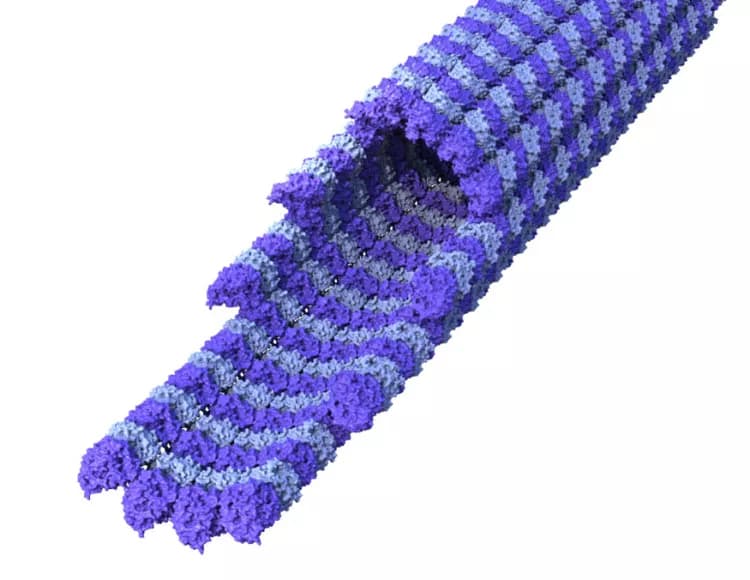
How Your Cells Build Tiny 'Train Tracks' Could Shed Light On Human Disease
Researchers from the University of Warwick have discovered how cells in the human body build their own 'railway networks', throwing light on how diseases such as bowel cancer work. The results have just been published in Nature Scientific Reports.
Professor Rob Cross, Professor of Mechanochemical Cell Biology at Warwick Medical School, said: "Every cell in our bodies contains a railway network, a system of tiny tracks called microtubules that run between important destinations inside the cell and allow cargo to be carried from one place to another. The tracks of this cellular railway are almost unimaginably small -- just 25 nanometers across (a nanometer is a millionth of a millimeter). The railway is just as crucial to a well-run cell as a full-size railway is to a well-run country."
The microtubule tracks are vital for functions such as cell division and are a key target for key cancer drugs. The Cross lab is researching how these microtubule tracks are assembled.
Professor Cross said: "It has been known for some time that a team of proteins called TOGs sits on the tip of the growing microtubule track and works like a team of tiny railway workers to rapidly lay the new microtubule track. But exactly how this team works so effectively has been mysterious."
In their new work the Cross lab shows that TOGs are held in place at microtubule tips by other proteins called TACCs, and that the TOG-TACC machinery then stabilises the growing microtubule track as well as speeding up the assembly of the new track.
The tip-tracking TOG-TACC machinery acts as a catalyst of microtubule assembly, and it turns out, based on the new results, that TOG-TACC is a very unusual type of catalyst that stabilises its product (the microtubule railway) as well as speeding up its growth.
By revealing how microtubule growth is catalysed, the WMS team expect their work to throw new light on the workings of a number of human diseases (for example, bowel cancer) linked to abnormalities in TOG-TACC function.
The above post is reprinted from materials provided by University of Warwick. Note: Materials may be edited for content and length.
Disclaimer: DoveMed is not responsible for the adapted accuracy of news releases posted to DoveMed by contributing universities and institutions.
Primary Resource:
Hussmann, F., Drummond, D. R., Peet, D. R., Martin, D. S., & Cross, R. A. (2016). Alp7/TACC-Alp14/TOG generates long-lived, fast-growing MTs by an unconventional mechanism. Scientific Reports, 6.
Related Articles
Test Your Knowledge
Asked by users
Related Centers
Related Specialties
Related Physicians
Related Procedures
Related Resources
Join DoveHubs
and connect with fellow professionals

0 Comments
Please log in to post a comment.